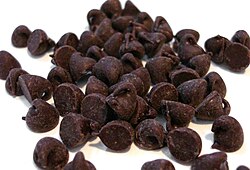 Semi-sweet chocolate chips Semi-sweet chocolate chips | |
| Type | Chocolate |
|---|---|
| Place of origin | United States |
| Main ingredients | Chocolate, sugar |
Chocolate chips or chocolate morsels are small chunks of sweetened chocolate, used as an ingredient in a number of desserts (notably chocolate chip cookies and muffins), in trail mix and less commonly in some breakfast foods such as pancakes. They are often manufactured as teardrop-shaped volumes with flat circular bases; another variety of chocolate chips have the shape of rectangular or square blocks. They are available in various sizes, usually less than 10 millimetres (0.39 in) in diameter.
Origin
Chocolate chips were created with the invention of chocolate chip cookies in 1937 when Ruth Graves Wakefield of the Toll House Inn in the town of Whitman, Massachusetts added cut-up chunks of a semi-sweet Nestlé chocolate bar to a cookie recipe. (The Nestlé brand Toll House cookies is named for the inn.) The cookies were a huge success, and Wakefield reached an agreement in 1939 with Nestlé to add her recipe to the chocolate bar's packaging in exchange for a lifetime supply of chocolate. Initially, Nestlé included a small chopping tool with the chocolate bars. In 1941, Nestlé and at least one of its competitors started selling the chocolate in "chip" (or "morsel") form.
Types
Originally, chocolate chips were made of semi-sweet chocolate, but today there are many flavors. These include bittersweet, peanut butter, butterscotch, mint chocolate, white chocolate, dark chocolate, milk chocolate, and white and dark swirled chips.
Uses

Chocolate chips can be used in cookies, pancakes, waffles, cakes, pudding, muffins, crêpes, pies, hot chocolate, and various pastries. They are also found in many other retail food products such as granola bars, ice cream, and trail mix.
Baking and melting
Chocolate chips can also be melted and used in sauces and other recipes. The chips melt best at temperatures between 104 and 113 °F (40 and 45 °C). The melting process starts at 90 °F (32 °C), when the cocoa butter starts melting in the chips. The cooking temperature must never exceed 115 °F (46 °C) for milk chocolate and white chocolate, or 120 °F (49 °C) for dark chocolate, or the chocolate will burn.
Although convenient, melted chocolate chips are not always recommended as a substitute for baking chocolate. Because most chocolate chips are designed to retain their shape when baking, they contain less cocoa butter than baking chocolate, and so can be more difficult to work with melted.
Availability
Chocolate chips are popular as a baking ingredient in the United States. Originating in the US, the chocolate chip cookie is widely available many parts of the world. Nestlé and the Hershey Company are some producers of chocolate chips.
References
- "Toll House Cookie History - Invention of Toll House Cookies". www.ideafinder.com. Archived from the original on 2009-03-17. Retrieved 2018-06-12.
- "NESTLÉ® TOLL HOUSE® Semi-Sweet Morsels Celebrates 75th Anniversary". Retrieved 2018-06-12.
- Chocolate Chip Cookies: Chip versus Morsel, The earliest references in published recipes and ads to the chip or morsel appear in the spring of 1941. Newspaper advertisements and published recipes from 1940 and earlier all refer to cutting up chocolate squares only.
- "A Brief History of the Chocolate Chip". Mental Floss. Retrieved 2018-06-12.
- Frost, Diana June; Adhikari, Koushik; Lewis, Douglas S. (January 29, 2011). "Effect of barley flour on the physical and sensory characteristics of chocolate chip cookies". Journal of Food Science and Technology. 48 (5). Springer Science and Business Media LLC: 569–576. doi:10.1007/s13197-010-0179-x. ISSN 0022-1155. PMC 3551113. PMID 23572789.
- Szogyi, A. (1997). Chocolate: Food of the Gods. Contributions in intercultural and comparative studies. Greenwood Press. p. 137. ISBN 978-0-313-30506-1. Retrieved April 24, 2020.